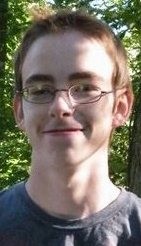Math Major Embraces Challenge

Applied mathematics major Alex McMillian enjoys a mathematical challenge.
Applied mathematics major Alex McMillian is halfway through his first semester in college, but he is classified as a sophomore. And that’s no surprise to his faculty mentor and mathematics professor Wei-Chi Yang. The Carroll County High School graduate is known for his eagerness for more challenging work. “He is far ahead of other classmates. When I slow down my pace, I will ask him to do some harder problems,” says Yang who teaches McMillian’s Math 430 Advanced Calculus class.
McMillian’s excitement in the extreme mental challenges inherent in abstract mathematics was fueled in high school. He earned 58 credits in mostly science and mathematics dual enrollment courses while in high school. "In my senior year in high school, I had a differential equations class at the Southwest Virginia Governor's School for Science, Mathematics and Technology, which is Math 346 at RU. I also tutored other high school students in chemistry and math. But I didn't have enough to do and jumped ahead in class," says McMillian. So he asked his teacher Mrs. Jerri England for more challenging work, and she let him move ahead in chapters that they would cover later in the year. Once he completed those in a matter of weeks, she gave him more challenges. "She always enjoyed that I was willing to learn more," he says.
McMillian has continued his drive to learn more mathematics at RU. "What intrigues me the most is how it is used everyday. Math helps explain how the world is what it is. I love math. Hopefully if I can get the skills and things done early, I won't have to worry about them in later classes," he says.
This semester, Yang took notice of McMillian's gift for mathematics and his dedication to his studies. "Math 430 is pretty abstract. Most students still live in calculus, ‘plug and chug’ answers, but Math 430 requires students to complete thorough proofs. So I spend time motivating my students about why we need such definition and how it is linked to what they have learned in a calculus course. Alex can almost bypass the 'motivation' stage and go right into the definition and theory, which is amazing," says Yang.
McMillian is now working with Yang on a research project to make the proof of Fundamental Theorem of Calculus (FTC) more accessible to students, and extend the proof to three dimensional. “The FTC is linked to Green’s, Divergence and Stokes’ Theorems, which have great applications in many applied sciences and engineering,” adds Yang.
Yang invited him to participate in the project when he exhibited mathematical expertise that was beyond the skills taught in class. “One day, I asked Dr. Yang a question after class. He then asked me about a proof that I did in a homework assignment, and whether I did it on my own or found it on the Internet. I told him I did it on my own. We had not covered anything like it in class. He told me he thought I was exceptional and asked me to drop by his office to talk about this research project,” says McMillian.
Research was not something McMillian thought he would be doing his very first semester in college. He is excited about the experience to work with Yang and be a part of a project that could help high school students and others to better understand FTC and the many applications of the calculus theorem to everyday life. “My ultimate career goal is to teach at a university. I tutored for three years in high school and now have a job at the RU Learning Assistance and Resource Center,” says McMillian. He also volunteers his time to help his fellow classmates in Yang’s class. “He will volunteer to conduct study sessions for my Math 430, which is wonderful. It is like having a tutoring session for my other Math 430 students,” says Yang.
Mathematics faculty member and McMillian’s advisor John McGee will also be conducting a project with him next semester. McMillian says that he is excited about all of the research opportunities available to him at Radford. These opportunities will give him the challenges he craves and offer him a chance to network with other mathematicians who are fascinated with math and its role in our lives.